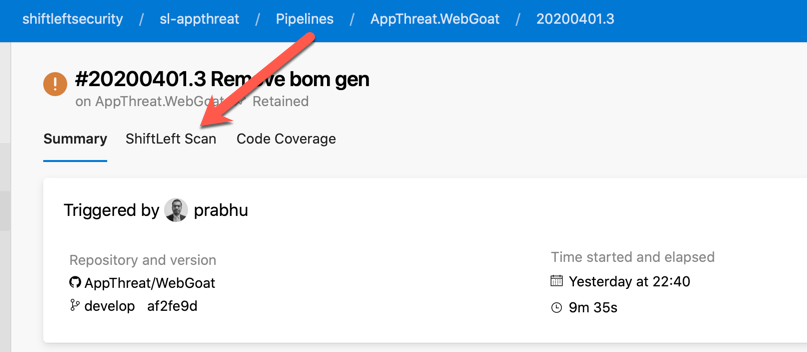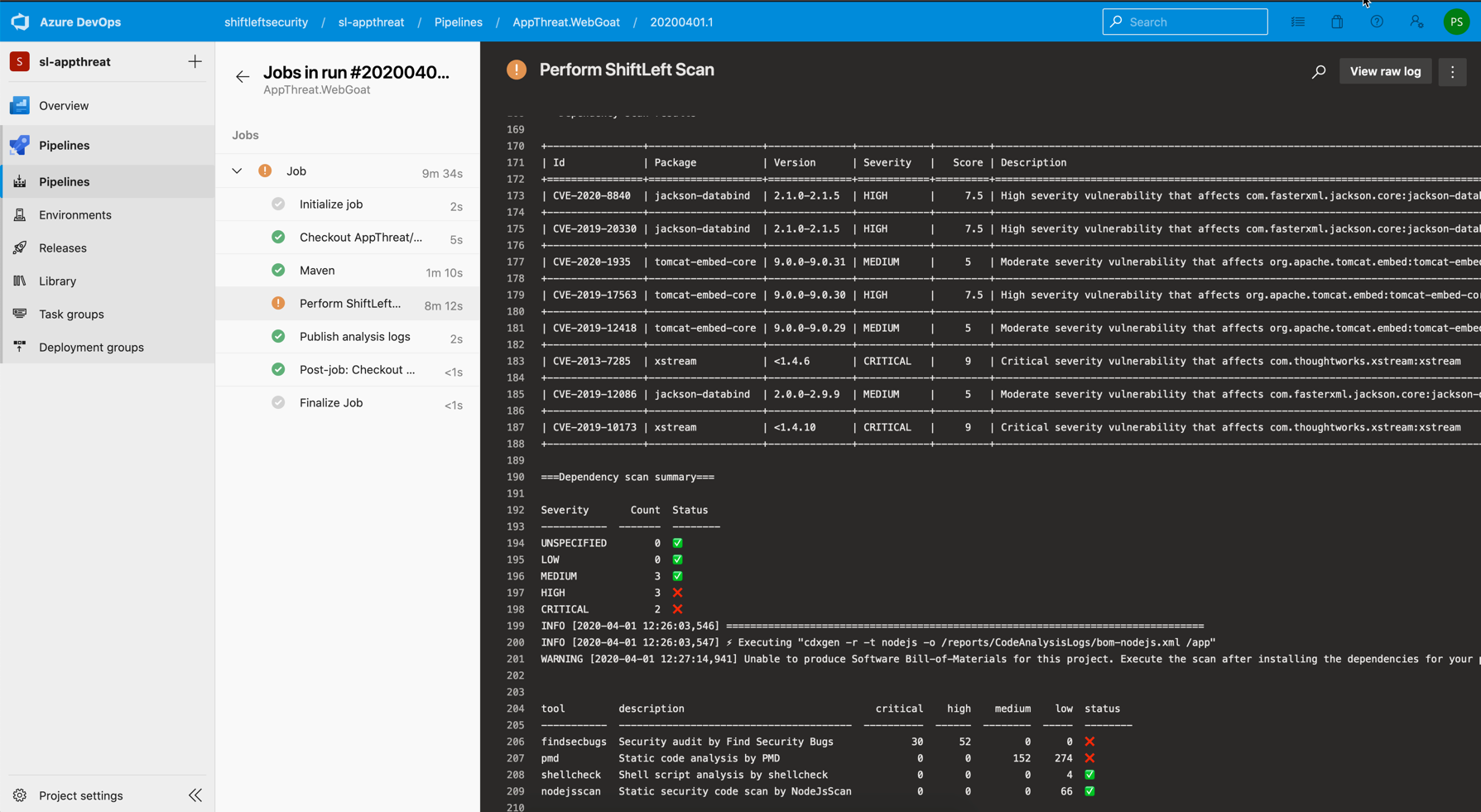Azure DevOps Pipelines
Integration with Azure DevOps Pipelines¶
Scan has a best-in-class integration for Azure Pipelines with our dedicated extension. Below are the steps for integration with a yaml based pipeline:
-
Install the extension to your Azure DevOps Organization. Ask your administrator for help if you do not have this permission.
-
Simply add the following snippet to your build configuration YAML file (Usually azure-pipelines.yml).
- script: |
docker run \
-e "VDB_HOME=/reports/vdb" \
-v "$(Build.SourcesDirectory):/app" \
-v "$(Build.ArtifactStagingDirectory):/reports" \
-u $(id -u):$(id -g) \
shiftleft/sast-scan scan --src /app --build \
--out_dir /reports/CodeAnalysisLogs --no-error
displayName: "Perform Scan"
continueOnError: "true"
- task: PublishBuildArtifacts@1
displayName: "Publish analysis logs"
inputs:
PathtoPublish: "$(Build.ArtifactStagingDirectory)/CodeAnalysisLogs"
ArtifactName: "CodeAnalysisLogs"
publishLocation: "Container"
-
Trigger a build as normal and wait for it to complete.
-
From the Pipelines page, select the most recent run. You should see a tab called Scan as shown below.

- Individual scan reports are shown as tabs as seen below. You can click on any tab to view and audit the different reports

- Summary would also be available in the build console logs for easy reference

AppImage based execution (Linux agents)¶
Scan AppImage executable can be used with Ubuntu 20.04 linux agent. The small size helps reduce the total time compared to the docker based invocation.
Below is a sample configuration for a Java + Maven based project.
trigger:
- master
pool:
vmImage: 'ubuntu-20.04'
steps:
- task: Maven@3
inputs:
mavenPomFile: 'pom.xml'
mavenOptions: '-Xmx3072m'
javaHomeOption: 'JDKVersion'
jdkVersionOption: '1.8'
jdkArchitectureOption: 'x64'
publishJUnitResults: false
goals: 'compile'
- task: Bash@3
displayName: Perform Scan
inputs:
targetType: 'inline'
script: |
sh <(curl https://slscan.sh/install)
$HOME/.local/bin/scan -t java,depscan -o $(Build.ArtifactStagingDirectory)/CodeAnalysisLogs
env:
WORKSPACE: https://github.com/prabhu/struts2-rce/blob/$(Build.SourceVersion)
GITHUB_TOKEN: $(GITHUB_TOKEN)
- task: PublishBuildArtifacts@1
displayName: "Publish analysis logs"
inputs:
PathtoPublish: "$(Build.ArtifactStagingDirectory)/CodeAnalysisLogs"
ArtifactName: "CodeAnalysisLogs"
publishLocation: "Container"
Try using the AppImage format first. If there are errors or no results (Everything scanner reporting 0) then try the docker based execution.
Container jobs based pipelines¶
By default, jobs run on the host machine where the agent is installed. This is convenient and typically well-suited for projects that are just beginning to adopt Azure Pipelines. On Linux and Windows agents, jobs may be run on the host or in a container. Scan support such container jobs based pipelines. Use container: shiftleft/sast-scan:latest as shown.
pool:
vmImage: "ubuntu-latest"
container: shiftleft/sast-scan:latest
steps:
# This integrates Scan with automatic build
- script: scan --build --out_dir $(Build.ArtifactStagingDirectory)/CodeAnalysisLogs
env:
WORKSPACE: https://github.com/prabhu/HelloShiftLeft/blob/$(Build.SourceVersion)
GITHUB_TOKEN: $(GITHUB_TOKEN)
displayName: "Perform scan"
continueOnError: "true"
# To integrate with the Scan Extension it is necessary to publish the CodeAnalysisLogs folder
# as an artifact with the same name
- task: PublishBuildArtifacts@1
displayName: "Publish analysis logs"
inputs:
PathtoPublish: "$(Build.ArtifactStagingDirectory)/CodeAnalysisLogs"
ArtifactName: "CodeAnalysisLogs"
publishLocation: "Container"
Further, by adding --build argument with scan command supported projects such as java, csharp, go or node.js can also be built on the fly thus speeding up the analysis. Please use container job based pipelines if your organization supports.
Advanced configuration¶
You can improve the quality of the dependency scan (--type depscan) by passing a GITHUB_TOKEN as an environment variable. This token should have the following scopes:
- read:packages
- script: |
docker run \
-e "GITHUB_TOKEN=$(GITHUB_TOKEN)" \
-v "$(Build.SourcesDirectory):/app" \
-v "$(Build.ArtifactStagingDirectory):/reports" \
shiftleft/sast-scan scan --src /app \
--out_dir /reports/CodeAnalysisLogs
displayName: "Perform Scan"
continueOnError: "true"
Refer to this configuration as an example.